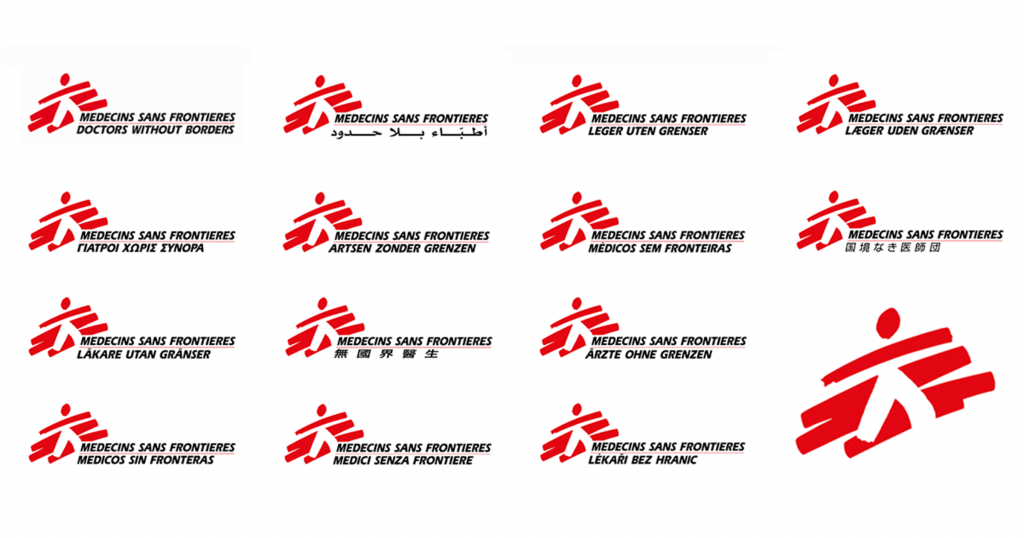
Médecins Sans Frontières (MSF) – Doctors Without Borders: activities and jobs
- Guide and tips, International NGOs, Job opportunity
Table of Contents
What is MSF? Quick brief.
1. History - Founded in 1971
While the interesting history of MSF filled with modern humanitarian challenges could easily fit a documentary, a thesis, a website, or an article. We will summarise it by saying that MSF initiated the “Without Borders” movement and built their fame by following a strong ethical standpoint both on their work and in the news, which is the basis of the MSF charter:
- Medical emergencies first;
- Testimonies;
- Medical ethics;
- Defence of human rights;
- Independence, impartiality, neutrality, responsibility, and transparency;
- Volunteering mindset;
- Associative structure.
2. Nobel Peace Prize - 1999
“Humanitarianism is not a tool to end war or to create peace. It is a citizen’s response to political failure. It is an immediate, short term act that cannot erase the long term necessity of political responsibility.” James Orbinski
3. MSF today: sector of interventions
Médecins Sans Frontières (MSF) employs 41,000 people and provides emergency medical assistance to populations in danger in more than 70 countries. It helps people whose survival is threatened by violence, neglect, or catastrophe, primarily due to armed conflict, epidemics, malnutrition, exclusion from health care, or natural disasters (2%). They also share testimonies from the people: to raise awareness on the forgotten crisis, to alert the opinion on unnoticed exactions, to critic the lack of aid system, or when aid services are misused to benefit political objectives (speaking out).
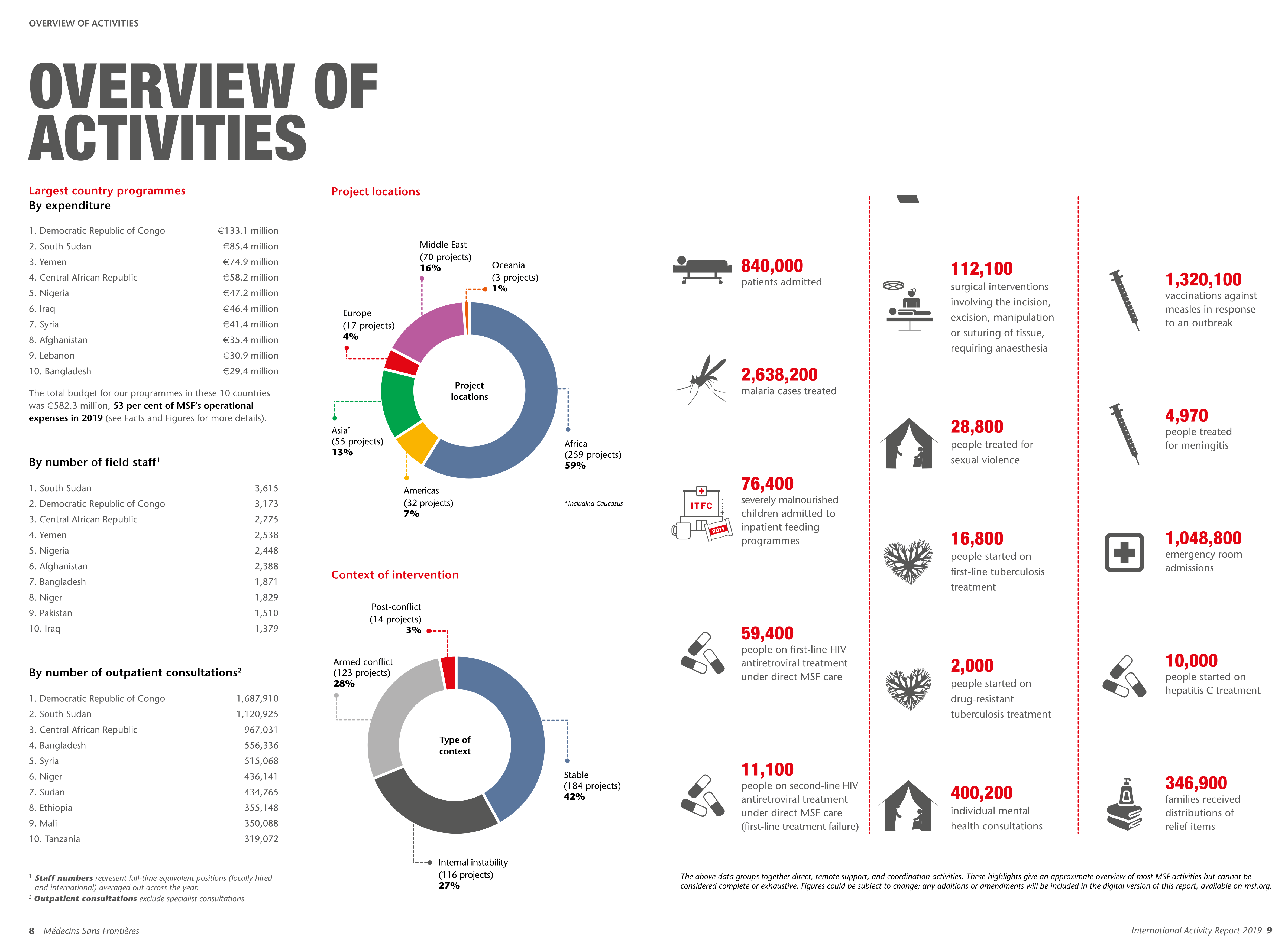
You can browse the specific activities they are doing on their topics portal or their annual activity report 2019 (image).
How does MSF operate?
1. The five Operational Centres (OC)
Many people could think of MSF as a single international association but it’s a bit more complex than that. MSF has 25 independent national associations, also called sections, all bound by the MSF charter. Each one of these sections has its board members elected during their General Assembly by its members.
Among the 25 sections, five Operational Centres (OC) are directly managing the humanitarian action in the field: they decide when, where, and what medical care is needed:
- Amsterdam (OCA)
- Barcelona & Athens (OCBA)
- Brussels (OCB)
- Geneva (OCG)
- Paris (OCP)
Finally, MSF has regional branch offices (9 in France) managed by volunteers (bénévoles) and in charge of organising events locally: information sessions, testimonies, presentation in schools, …
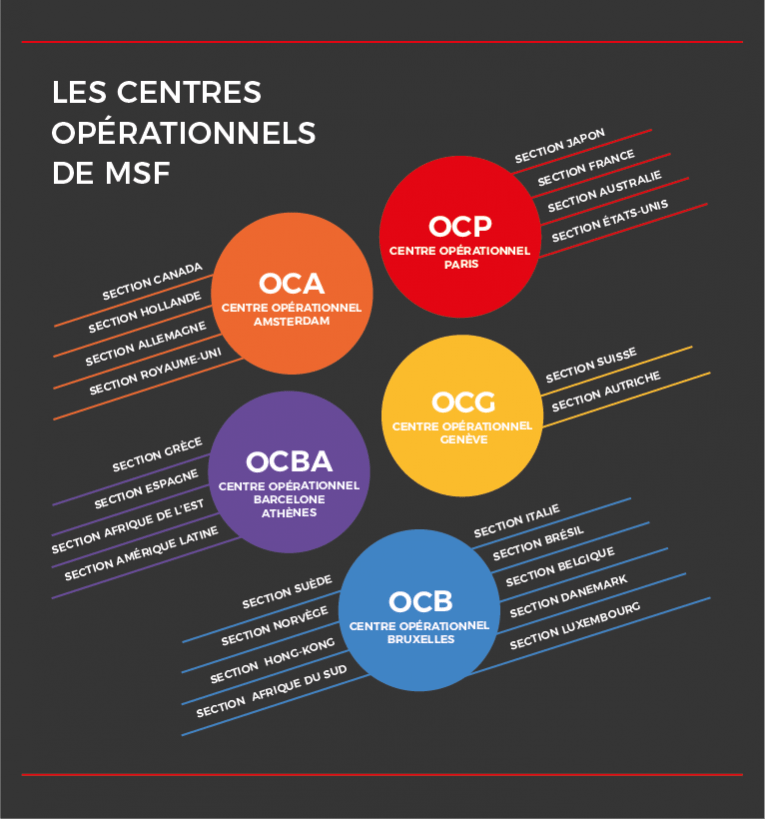
2. MSF International
The 25 MSF associations are members of “MSF International”. This association, based in Geneva and chaired by an elected International President every three years, is in charge of representing MSF internationally and safeguarding the identity of the “MSF movement” by organizing internal debates and providing a strategic orientation (coordination, information, and support) to all MSF entities.
Beside this coordination, natural collaboration and information-sharing are happening between the associations in the field, to offer a coherent and efficient response during disasters. Because as you may have understood, several Operational Centres may operate within the same country on different projects and/or different regional location.
3. Other MSF initiatives
- Epicentre (1986) conducts field epidemiology activities, research projects and training in support of MSF’s goal.
- Using the prize money from the Nobel Peace Prize awarded in 1999, MSF set up ACCESS Campaign to overcome barriers to access to essential drugs, stimulate research and development for neglected diseases, and promote “health exceptions” to global trade agreements.
- Crash Foundation (Centre de Réflexion sur l’Action et les Savoirs Humanitaires), also created in 1999, initiates debates and critical-thoughts on-field practices and public positions to improve MSF’s actions.
- Drugs for Neglected Diseases initiative (DNDi) is a collaborative non-profit organisation developing new treatments for neglected diseases. Since 2003, they already developed 8 treatments for 5 deadly diseases.
- There are other associations such as “Les Centrales” in charge of logistics: MSF Logistique (Bordeaux, France) and MSF Supply (Brussels). They buy, stock, prepare, and send medical and non-medical supply to countries where it’s needed. It also includes the APU -Amsterdam Procurement Unit- (Amsterdam) as the purchasing centre for OCA.
Because each section is independent, they may have unique “Units”, but we couldn’t find a proper list. We wanted to emphasize it though because MSF Sweden has a “Sweden Innovation Unit (SIU)” which seemed important to mention.
Operational Centre Paris (OCP)
The five OCs organise monthly info-session for people willing to join the MSF’s family. We joined the one organised by OCP and we will share here the information gathered.
Because OCs are independent, the following information concerns only the specific Operational Centre of Paris, even though we believe similarities should be found with the four other OCs.
1. A few numbers about OCP
Employment
- 8155 national employees working full time. And 530 employees working at the headquarters.
- 1748 international employees travelled to a field operation (6 months). For a quarter (1/4) of them, it was their first mission.
Origin of resources: 414 million € in 2019
- 73.8% are from fundraising with private donors. NB: if we check the MSF International Finances Report, it raises to 96.2%.
- 25.3% are from other resources.
- 0.9% are from institutional resources.
Allocation of funds: 409 million € in 2019.
- 91.5% on programs: expenses, support and awareness-raising.
- 5% on management and administration.
- 3.5% on fundraising.
2. How does OCP work? The organizational chart
Better than a thousand words, we have created this infographic to help you understand the functioning of OCP.

We can emphasise that the offices are “divided” in two:
- the Head Office, based in Paris; and
- the MSF Offices based in the country of operations. In these countries, the main office is based in the capital while the MSF projects are happening around the country.
The hierarchy line is going from the Cell Manager to the Head of Mission and the Project Coordinator. But each employee working in the field can seek support from their specific Support Department.
How to apply and get a job with OCP?
There is typically two types of work: in the field or the head office. If you want to work in the office you can apply to any of the sections. But if you want to work in the field, then you must apply to one of the five Operational Centres. Check out this page to quickly find out. Here, we will focus on working in the field as an international employee.
1. International employees
Working with MSF in the field requires a strong personal commitment and a real reflection on the good and bad sides of such a life-project. Like many NGOs, MSF doesn’t accept interns in the field but rather very experienced professionals: medical, paramedical and non-medical staff (administration, finance, logistics, communication).
Requirements are as follow:
- Minimum of two years of professional experience (not internships).
- Level B1 in English. C1 for profiles such as communication officer. The level is evaluated by a third-party.
- Availability for 6 to 9 months.
- Able to work in multidisciplinary and multicultural teams.
- Experience in managing and teaching is a plus (to transfer skills to locals).
- Appreciated: experience in volunteering with associations (quality over quantity); experience in travelling;
- Appreciated: show a matured preparation to start this mission, i.e. participated in MSF info-session.
- Non-family duty station: it means that families and partners cannot join you in the field.
- Flexibility and adaptability, i.e. able to take a flight at 4:00 am.
- Ability to resist to stress. In good health conditions.
- Appreciated: expert in humanitarian-related topics such as tropical diseases for doctors.
2. Recruiting procedure
You do not choose the country of destination.
During the information meeting, a former employee explained her journey through the recruiting process:

3. First time? Become a volunteer
In France, “volunteering” has two translations:
- Bénévolat: volunteering in a formal or non-formal way for free.
- Volontariat: signing a contract for a full-time job, with financial retribution, but not considered as an employee.
Volunteer – 12 months:
- 1134€/month (2021) non-taxable.
- As a French citizen, it doesn’t give a right to unemployment but it contributes to the retirement plan of “French people abroad”.
Employee – After 12 months:
- Employed with a fixed-term contract: from 1555€ to 4091€ gross (2021) depending on the level of responsibility and professional experience. Missions tend to be 6 or 12 months.
MSF also pays for the transport, the accommodation, the insurance, the health (cost of vaccination covered), provide a per diem (food), and paid-holidays.
MSF is aware that their offer can be precarious. A real conversation will begin with your Pool Manager to understand your goals and availabilities. They will not ask you to break your contract with your company to join MSF because MSF cannot secure you full-time employment.
4. Mission in the field: what should you expect?
Life during a mission can greatly vary from one destination to another. All the employees are living in the same accommodation and this accommodation may be very precarious (a tent) but might as well be quite a spacious house. In the field, you are expected to work six days a week (sometimes seven) so the house becomes the only place to rest from exhausting days. Moreover, you might be forbidden to go out of the house for security issues (kidnapping or terrorist attack) so any extra bit of comfort provided by MSF for your mental health is enjoyable.
You are allowed one week off every three months and depending on the hardship of your duty station, you are allowed a complete weekend off at the Capital every six weeks. During these holidays, MSF finances to a certain extent the travel to neighbouring countries.
As a medical emergency NGO, you should be aware that you will most probably face traumatic events such as seeing numerous dead bodies which is also the reality of this job.
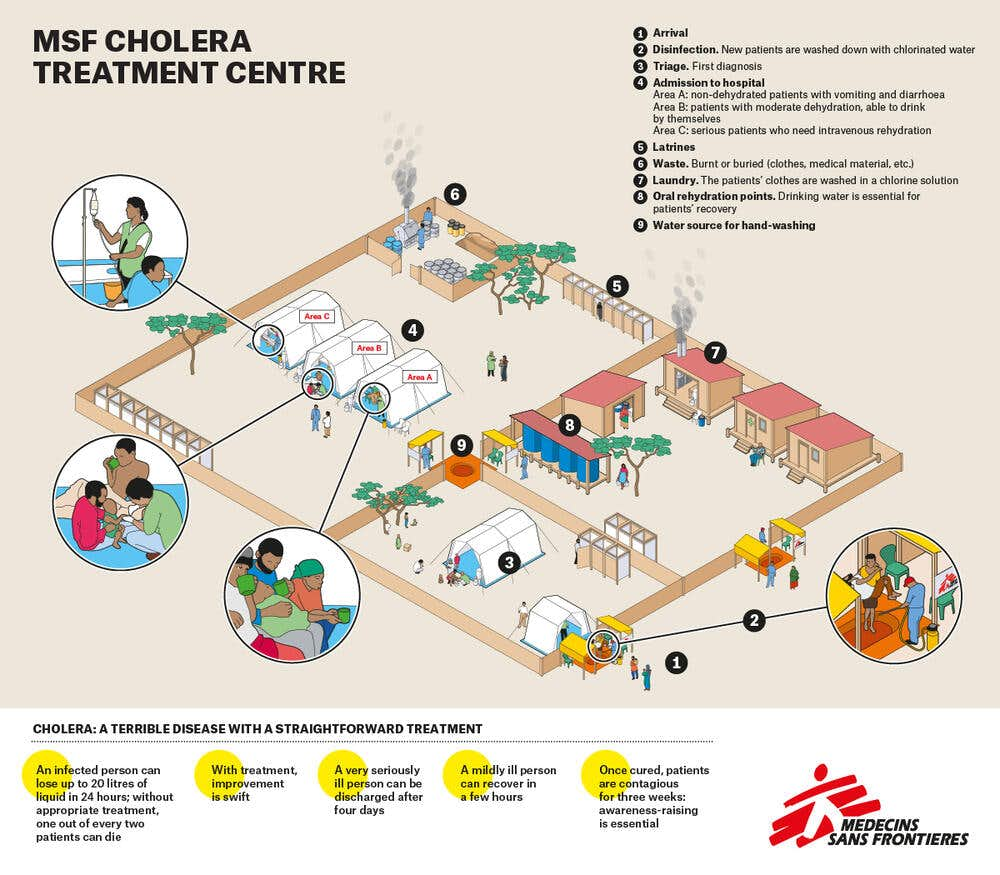
5. Communication officer
Of course, Humanitarian Designers is focusing on professions that could be done by designers. The only one fitting our skills is Field Communications Officer. You can check the requirements:
6. Other design-related jobs?
This article emphasized the international operations but of course, the Head Offices of each OC have more “classic” needs such as graphic designers, web-designers, motion designers, to create the annual reports, infographics, and online content. They also hire interns.
Where to start?
1. The information session
Our goal with Humanitarian Designers is to give the keys to designers to start their committed journey. If you followed our article meticulously, you should know that your next step is to participate in one of the information sessions organised by the Operational Centres so you can ask them all your questions:
2. Your own research
A lot of things have yet to be (un)covered about MSF. Another way to start your journey with MSF is to check out for events, read reports and articles:
- A good place to hear about events is on Linkedin. Or by subscribing to their Newsletters.
- The MSF Brand Guidelines to learn more about their graphic identity and the Running Person Logo.
- The creative WhoWhat about MSF projects, a Resource Center, the Evaluation Center, or the photos guidelines can help you to learn more about their work and standards.
- MSF.org has “Patient blogs” and “Staff blogs” where people can share their stories.
Research their blog and you will realise that they have 143 results for the keyword “designer”.
Yes. MSF has global strategies to innovate in humanitarianism, health, and logistic: DNDi, CRASH, ACCESS are just concrete examples of large scale innovations.
But those 143 articles are probably more about tiny individual collaborations between one independent MSF Section and one stakeholder such as a design consultant, a design agency, an employee, an intern, a school, a company, … Indeed, it’s generally difficult for NGOs to allocate funds, received from donations, to experiment.
It’s a matter of finding the right MSF employee with the right mindset, at the right momentum, and to propose the right project that fits MSF’s goals or answers MSF’s challenges… And that is maybe the most difficult part of it. But it does happen, for example with design agencies such as Namahn in Brussels or Hetco Design in London to name the ones we know and appreciate.
One of the challenges that NGOs want to improve is “coordination”. More and more, NGOs are creating networks and organising events to learn from each other, doing cost-efficient innovation, and coordinate their response better.
For example, MSF UK organises the yearly MSF Scientific Days focusing on research and innovation from across MSF. The next one will take place online from 18 to 20 May 2021. This event is a great initiative to share innovative projects and methods across the independent MSF Sections. It improves their awareness of the Movement and allows them to share and potentially replicate innovative methods.
On a last minute update, fresh from the MSF Sweden Innovation Unit‘s newsletter, here is the just-released report called “MSF Innovation – Round up 2020” which is another great initiative to improve global coordination.
While this conclusion was more an introduction to start your own research, you can also contact us and join our community to get more information.
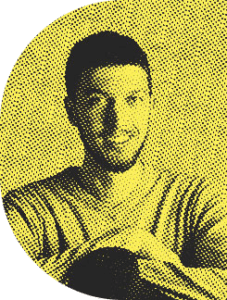
Cédric Fettouche
Cédric Fettouche works as a design strategist for the European Commission on the New European Bauhaus Initiative.
After three years of humanitarian experience in Greece and Central Mediterranean, he founded the NGO Humanitarian Designers (HD) in 2021 to bridge the gap between the design and humanitarian sectors.
Passionate about design and societal challenges, he strives to experiment his committed vision into new sectors, and share his learnings back to the design communities. You can contact him on Linkedin or on the HD Slack.
